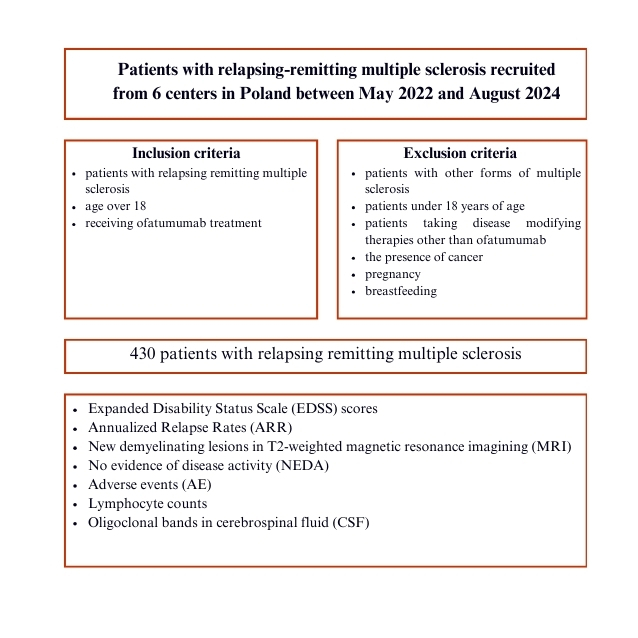Current issue
Archive
Manuscripts accepted
About the Journal
Editorial office
Editorial board
Section Editors
Abstracting and indexing
Subscription
Contact
Ethical standards and procedures
Most read articles
Instructions for authors
Article Processing Charge (APC)
Regulations of paying article processing charge (APC)
NEUROLOGY / RESEARCH PAPER
Early treatment with ofatumumab increases the likelihood of stabilizing
disease in patients with relapsing-remitting multiple sclerosis.
1
Wojskowy Instytut Medyczny - Państwowy Instytut Badawczy, Poland
2
Szpital Specjalistyczny Świętego Łukasza w Końskich, Poland
3
Oddział Neurologii - Szpital Kliniczny Uniwersytetu Medycznego im. Karola Marcinkowskiego w Poznaniu, Poland
4
Klinika Neurologii, Śląski Uniwersytet Medyczny w Katowicach, Poland
5
Oddział Neurologii - Szpital Specjalistyczny im. Ludwika Rydygiera w Krakowie, Poland
6
Katedra Informatyki Ekonomicznej i Medycznej, Uniwersytet Łódzki, Poland
7
Klinika Neurologii Dorosłych, Gdańsku Uniwersytet Medyczny, Poland
8
Klinika Neurologii Dorosłych, Gdański Uniwersytet Medyczny, Poland
Submission date: 2024-12-21
Final revision date: 2025-02-04
Acceptance date: 2025-05-14
Online publication date: 2025-06-24
Corresponding author
Aleksandra Pogoda-Wesołowska
Wojskowy Instytut Medyczny - Państwowy Instytut Badawczy, Szaserów 128, 04-141, Warszawa, Poland
Wojskowy Instytut Medyczny - Państwowy Instytut Badawczy, Szaserów 128, 04-141, Warszawa, Poland
KEYWORDS
TOPICS
ABSTRACT
Introduction:
The methods of multiple sclerosis (MS) treatment are evolving rapidly with numerous classes of disease-modifying therapies (DMTs). A more aggressive approach to early and effective treatment of MS with defined treatment target increases the chance of achieving a state of no no evidence of disease activity (NEDA). Currently, B cell–depleting monoclonal antibodies have been proven as high effective strategy for the treatment of relapsing-remitting MS (RRMS). Ofatumumab (OFA), anti-CD-20 monoclonal antibody is effective in treatment of RRMS, as it positively affects relapse rates, magnetic resonance imaging (MRI) measures of disease activity and disability progression.
Material and methods:
A retrospective observational study conducted in six MS clinical centers in Poland, including a cohort of patients with RRMS treated with OFA over a two-year period was presented.
Results:
The results of this study showed a statistically significant decrease in the relapse activity of the disease in the course of a year of OFA therapy. The percentage of patients free of relapses increased from 45% before treatment to 88% after one year of follow-up. Moreover, the disability assessment index measured by the Expanded Disability Status Scale (EDSS) remained stable after a two years of follow-up.
Conclusions:
In the presented study the high efficacy of OFA therapy in reducing recurrent disease activity as well as in inhibiting disability progression, with a favorable safety profile was confirmed. Moreover, it was emphasized that to achieve the best possible inhibition of disease activity and its progression, it is necessary to implement the treatment as soon as possible after the diagnosis.
The methods of multiple sclerosis (MS) treatment are evolving rapidly with numerous classes of disease-modifying therapies (DMTs). A more aggressive approach to early and effective treatment of MS with defined treatment target increases the chance of achieving a state of no no evidence of disease activity (NEDA). Currently, B cell–depleting monoclonal antibodies have been proven as high effective strategy for the treatment of relapsing-remitting MS (RRMS). Ofatumumab (OFA), anti-CD-20 monoclonal antibody is effective in treatment of RRMS, as it positively affects relapse rates, magnetic resonance imaging (MRI) measures of disease activity and disability progression.
Material and methods:
A retrospective observational study conducted in six MS clinical centers in Poland, including a cohort of patients with RRMS treated with OFA over a two-year period was presented.
Results:
The results of this study showed a statistically significant decrease in the relapse activity of the disease in the course of a year of OFA therapy. The percentage of patients free of relapses increased from 45% before treatment to 88% after one year of follow-up. Moreover, the disability assessment index measured by the Expanded Disability Status Scale (EDSS) remained stable after a two years of follow-up.
Conclusions:
In the presented study the high efficacy of OFA therapy in reducing recurrent disease activity as well as in inhibiting disability progression, with a favorable safety profile was confirmed. Moreover, it was emphasized that to achieve the best possible inhibition of disease activity and its progression, it is necessary to implement the treatment as soon as possible after the diagnosis.
Share
RELATED ARTICLE
We process personal data collected when visiting the website. The function of obtaining information about users and their behavior is carried out by voluntarily entered information in forms and saving cookies in end devices. Data, including cookies, are used to provide services, improve the user experience and to analyze the traffic in accordance with the Privacy policy. Data are also collected and processed by Google Analytics tool (more).
You can change cookies settings in your browser. Restricted use of cookies in the browser configuration may affect some functionalities of the website.
You can change cookies settings in your browser. Restricted use of cookies in the browser configuration may affect some functionalities of the website.



